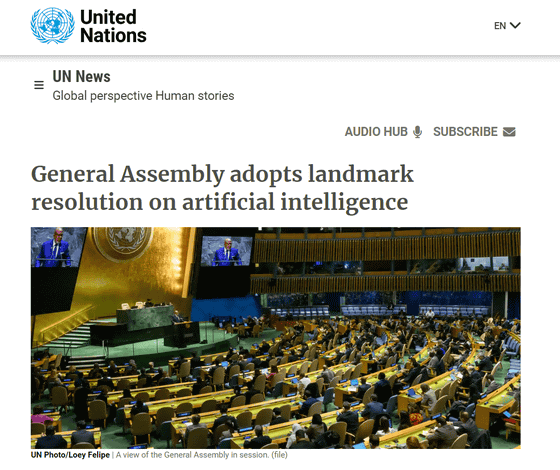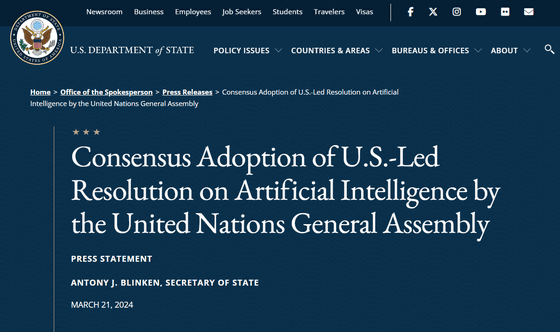The United Nations unanimously adopted the first global resolution on AI, protecting personal information, monitoring AI risks, etc.

On March 21, 2024, the United Nations General Assembly unanimously adopted the first global resolution on AI. This resolution, proposed by the United States and endorsed by 121 countries, aims to protect human rights by promoting the protection of personal information, strengthening privacy policies, and monitoring AI risks.
General Assembly adopts landmark resolution on artificial intelligence | UN News

Consensus Adoption of US-Led Resolution on Artificial Intelligence by the United Nations General Assembly - United States Department of State
https://www.state.gov/consensus-adoption-of-us-led-resolution-on-artificial-intelligence-by-the-united-nations-general-assembly/

UN adopts first global artificial intelligence resolution | Reuters
https://www.reuters.com/technology/cybersecurity/un-adopts-first-global-artificial-intelligence-resolution-2024-03-21/
The United Nations General Assembly has urged all member states and stakeholders to 'refrain from or cease the use of AI systems that cannot be operated in accordance with international human rights law or that pose an unreasonable risk to the enjoyment of human rights.' 'The rights people have offline must be protected online, including throughout the lifecycle of AI systems,' the report argued.
The United Nations General Assembly also urged all countries, the private sector, civil society, research institutions, and the media to 'develop and support regulatory and governance approaches and frameworks related to the safe, secure, and trustworthy use of AI.' is.
Although the resolution adopted this time is not legally binding, it could be an important step in building an international consensus on AI governance. In response to the UN General Assembly resolution, Microsoft Vice Chairman and President Brad Smith said: ``We fully support the UN's adoption of a comprehensive AI resolution. 'It establishes an international pathway for the development of innovative technologies and is an important step in ensuring that AI technologies meet the needs of everyone.'
We fully support the @UN 's adoption of the comprehensive AI resolution. The consensus reached today marks a critical step towards establishing international guardrails for the ethical and sustainable development of AI, ensuring this technology serves the needs of everyone.
— Brad Smith (@BradSmi) March 21, 2024
According to Reuters, the resolution was proposed by the United States and co-sponsored by 122 countries including China and Russia, but negotiations took three months. U.S. negotiators acknowledged that they had had 'many heated conversations' with some countries, including China, Russia and Cuba, and said they were 'actively working with countries that often disagree with us on other issues.' 'We had a fair discussion,' he said.
Linda Thomas-Greenfield, the U.S. ambassador to the United Nations, said: ``Rather than letting AI technology overturn us, there is an opportunity and responsibility for the international community to overturn AI technology. Let us be reassured that development and deployment should be done through the lens of human rights and fundamental freedoms. Close the digital gap within and between countries, and use AI technology to build common ground on sustainable development. Let's commit to advancing our priorities.'

This is the first time that a resolution on AI has been adopted at the scale of the United Nations General Assembly, but other international AI agreements between multiple countries include the Bletchley Declaration signed by 28 countries including Japan in November 2023, and the Bletchley Declaration in the same year. There are `` Guidelines for the Development of Safe AI Systems '' jointly formulated by the United States and the United Kingdom in November.
Related Posts:







